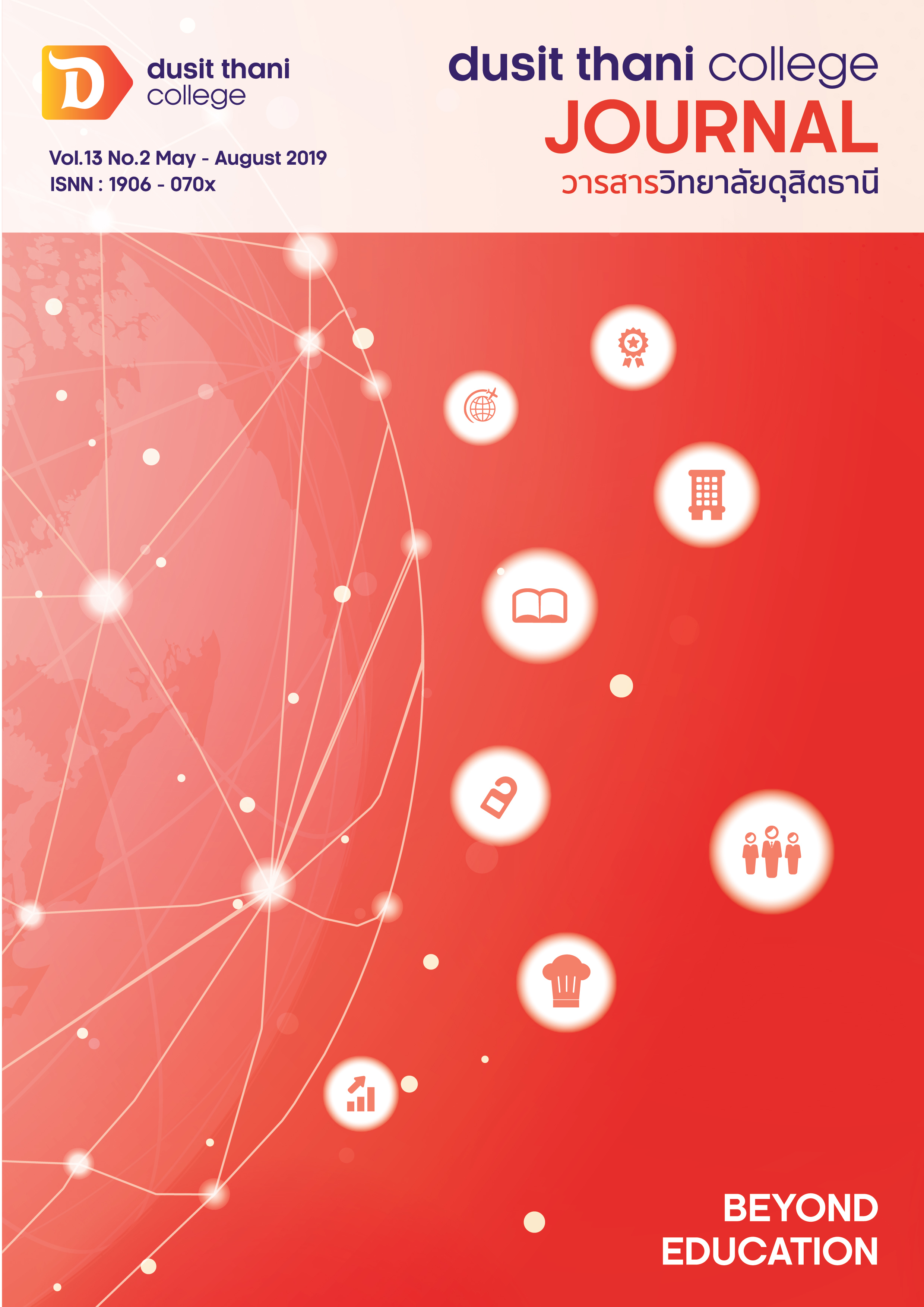Emergence of Ecotourism in Thailand
Main Article Content
Abstract
The purpose of this paper is to study ecotourism in Thailand. Ecotourism is tourism in a natural environment where tourism resources are well-taken care, and also tourists can learn and enjoy nature; while local community take part in the management of ecotourism. The sustainable growth of the foreign tourist arrivals is encouraging Thailand to promote the ecotourism to provide a wider scope of it. The ecotourism plays a major role to eradicate poverty of isolated part of the underdeveloped areas of the nation. Therefore, the needs of drastic ecotourism policies to promote and designate areas for ecotourism destinations. The role of the government organization is identifying the new eco-destination and develop basic infrastructure for it. Finally, after reviewing various literature can be concluded with guidelines for eco-tourism and its needs for long-term strategic government policies to maintain the ecosystem in Thailand.
Article Details
Article Screening Policy
- All research and academic articles to be published must be considered and screened by three peer reviews in the relevant field / article.
- All articles, texts, illustrations and tables published in the journal are the personal opinions of the authors. Editors don't always have to agree. And no responsibility whatsoever is the sole responsibility of the author.
- The articles to be published must never be published. Where did you first publish? And not in the consideration of other journals If the audit found that there has been a duplicate publication It is the sole responsibility of the author.
- Any article that the reader sees as being plagiarized or impersonated without reference. Or mislead the work of the author Please let the journal editor know it will be your greatest blessing.
References
– EAGA. (2010, September). Draft final report: BIMP – EAGA Community based ecotourism strategy 2010 – 2015. Retrieved from http://www.bimp-eaga.org/
2. Boonyanate, S. (2007). Ecotourism for Sustainable Development in Thailand. Retrieved from http://www.powershow.com/view1/1e8f9d-ZDc1Z/Ecotourism_for_Sustainable_Development_in_Thailand_powerpoint_ppt_presentation.
3. Ceballos-Lascurain, H. (2006). "Arg. Hector Ceballos-Lascurain: The Architect of Ecotourism". ECOCLUB; International Ecotourism Monthly, (85), pp.2-4.
4. Cochrane, J. (2007). Ecotourism and biodiversity conservation in Asia: Institutional challenges and opportunities. In J. Higham (Ed.), Critical Issues in Ecotourism: Understanding a complex tourism phenomenon (pp. 287-307). Oxford, UK: Elsevier.
definitions-of-ecotourism-nature-tourism-sustainable-tourism.html. retrieved from https://www.gaiadiscovery.com/travel-transportation/definitions-of-ecotourism-nature-tourism-sustainable-tourism.html 4 April 2017.
5. Fletcher, R. (2015). Nature is a nice place to save but I wouldn’t want to live
there: environmental education and the ecotourist gaze. Environmental
Education Research, 21(3), pp.338-350.
6. Honey, M. (1999). Ecotourism and Sustainable Development: Who Owns Paradise? Island Press, Washington DC.
7. Khanal, B. R. & Babar, J. T. (2007). Policy Brief: Community based ecotourism for sustainable tourism development in the Mekong Region. Hanoi, Vietnam: CUTS Hanoi Resource Centre.
8. Kim, S. I., Kang, M., & Sukmajaya D. (Eds.). (2013). Opportunity and Challenges of Ecotourism in ASEAN Countries. Seoul, Korea: Jungmin Publishing Co.
9. Krung Thai Bank Ltd. (1991). Tourism. Thailand in the 90s (pp. 207-213). Thailand: the National Identity Office of the Prime Minister.
10. Quebec Declaration on Ecotourism. (2002). In: World Ecotourism Summit.
[online] Quebec City. Available at: http://www.gdrc.org/uem/ecotour/
quebec-declaration.pdf.
11. Reisinger, Y. (2009). Globalization, tourism and culture: Globalization and the tourism industry. International Tourism: Cultures and Behavior (pp. 8-13). Oxford, UK: Butterworth-Heinemann Elsevier Ltd.
12. Sangpikul, Aswin. (2015). An Investigation of Ecotourism Code of Conduct A Comparative Study Between Thai and Malaysian Tour Operators. Journal of Community Development Research (Humanities and Social Sciences) 2015; 8(3) (pp. 13-33)
13. Sarobon, Sin. (2004). Community Based Tourism. Chiang Mai Amity Green Hill Hotel during 22-23 January 2004.
14. Thavarasukha, Vunsadet. (2002). Ecotourism case studies in Thailand. Linking green productivity to ecotourism: Experiences in the Asia – Pacific Region (pp. 226-235). Queensland, Australia: Asian Productivity Organization (APO)
15. The Adventure Travel Trade Association [ATTA]. (1990). Values of ATTA. Retrieved from http://www.adventuretravel.biz/about/atta-members/
16. The Cambridge Dictionary. (2005). Definition of Cruise ship. Retrieved from http://www.windrosenetwork.com/The-Cruise-Experience-Definition-and-Conceptualization
17. The International Ecotourism Society [TIES]. (2015). What is Ecotourism? Retrieved from http://www.ecotourism.org/what-is-ecotourism
18. Tourism Authority of Thailand. (1987). Ecotourism in Thailand. Bangkok: Tourism Authority of Thailand.
19. Thailand.Tourism Authority of Thailand. (2011). Thailand Green Journey. Bangkok.
UNEP (220). United Nations Environmental Program: Annul Report.
20. Wickes, B., & Dr. Merrett, C. (2007, November 8). Illinois Institute for Rural Affairs (IIRA) Rural Research Report: Fulton-Mason Workshop to Explore Agritourism. Retrieved from http://web.extension.illinois.edu/state/newsdetail.cfm?NewsID=8027
21. World Economic Forum [WEF]. (2012). The ASEAN Travel & Tourism Competitiveness Report 2012: Fostering Prosperity and Regional Integration Through Travel and Tourism. Geneva, Switzerland: World Economic Forum.
22. Wearing, S. and Neil, J. (2008). Ecotourism: Impacts, Potentials and Possibilities. Elsevier Science, UK.
23 Ziffer, K. (1989). Ecotourism: The Uneasy Alliance. Washington D.C., Conservation International.


